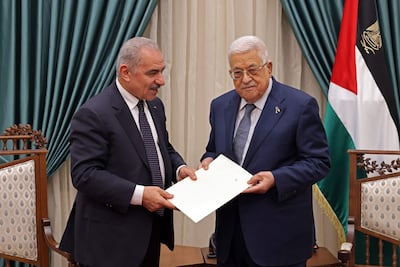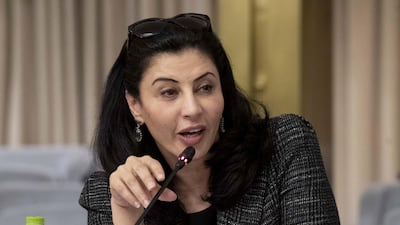Live updates: Follow the latest news on Israel-Gaza
A Palestinian woman could make history as the first female foreign minister under a rebranded and reformed Palestinian Authority (PA), sources told The National on Tuesday.
Mohammad Shtayyeh submitted his resignation as prime minister to President Mahmoud Abbas on Monday, paving the way for a cabinet reshuffle that could open doors for reforms following increasing pressure on the PA since Israel's war in Gaza began in October.
Hours after Mr Shtayyeh stepped down, Palestinian sources told The National Amal Jadou, who is currently Undersecretary at the Ministry of Foreign Affairs and Expatriates, may soon find herself appointed to the rank of minister in the new government.
She would be the first Palestinian female foreign minister, although women have held other ministerial posts in previous Palestinian governments.
If confirmed, Ms Jadou would replace Riyad Al Maliki as part of an entire cabinet reshuffle, according to the same sources.
A source close to the Palestinian presidency in Ramallah confirmed "Amal Jadou is among the names being discussed for the foreign minister position".
The source said there had been "great pressure exerted by the Americans before the resignation of the Shtayyeh government, to prepare the Palestinian political arena for the so-called next day after the war in Gaza".
The new government is expected to be a technocratic one, with Mr Abbas still at the helm. Secretary General of the Palestine Liberation Organisation Hussein Al Sheikh is also expected to remain part of the government.
Israeli officials have repeatedly said the future of Gaza would not include the militant group Hamas, while also undercutting the PA's ability to govern the strip.
A Palestinian official on Monday told The National "the goal of change is to present a new government that is internationally acceptable".
"A government that enjoys some credibility and is capable of implementing many international requirements, including financial control and auditing, in addition to being technocrat."

The US administration was hoping Mr Abbas – the ageing, unpopular leader of the PA – would agree to reform the government so that it could administer the occupied West Bank as well as the Gaza Strip after the conflict ends, as part of an effort towards the elusive two-state solution.
Mr Abbas, 88, known colloquially as Abu Mazen, has been President for 18 years and has shown little sign he is willing to step aside to allow for a new generation to lead.
Established in 1993 as part of the Oslo Accords, the PA, from its base in Ramallah, administers civilian affairs and co-ordinates with Israel on security.
The main candidate to lead the new government is Mohammad Mustafa, "an expert with an international dimension and linked to the world of investment", a Palestinian source has said. But other names are being discussed, too.
Born in 1954, Mr Mustafa has been a senior adviser to Mr Abbas on economic affairs since 2005. He has also served as deputy prime minister of the PA and minister for economy. He has been chairman of the Palestine Investment Fund and is the founding chief executive of telecoms provider PalTel.
Still, a new government whose only point of reference is the President would be "weak" and face constant opposition from non-participating factions, Hani Al Masri, director of Palestinian think tank Masarat, said on Tuesday.
"It will also be weak in the face of its people and the occupation, which does not want one strong government for the West Bank and Gaza Strip to keep the door open for unity and an independent Palestinian state."

